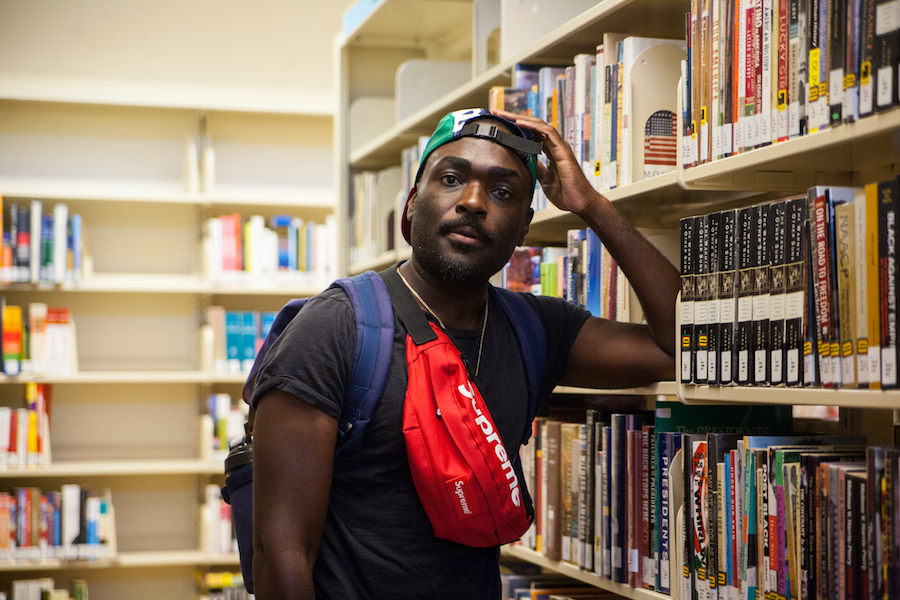Roy Kinsey might just be the only librarian in West Humboldt Park who’s dropped two rap albums this year. On the heels of his early 2018 release of Blackie — which was greeted with reviews and critical acclaim from publications like Billboard, the Los Angeles Times, and the Chicago Reader — he put out More Roy in late September. Most recently, Kinsey’s work caught the attention of Red Bull Music Festival Chicago, in which he’ll be performing on November 23 at Subterranean. He will also perform Blackie at Steppenwolf Theatre in January 2019.
Blackie wasn’t just another album to Kinsey, he says — it was a way to process and heal after the death of his grandmother. It helped him come more fully into his identity as a black queer rapper and librarian born and raised in Chicago. He says that creating Blackie helped him access creativity and material that he had not been able to before, leading to his follow-up EP More Roy.
Kinsey sat down with City Bureau to talk about his latest creative projects, expanding the definition of black wealth, and the gene for perfect pitch.
On family history
I remember when I was born and we lived in Chicago on the West Side. I do remember us walking around and my grandmother, who was from Ellisville, Mississippi, picking pennies from the street. I remember her working in a garden that was on the side of the building. Being able to grow your food is a wealth. To even understand life enough to put in work and then watch it grow is a wealth.
There’s so much beyond just the financial wealth. There’s the community, there’s a support system, there’s affirmation, there is the freedom and the space to explore and to be exactly who you are and who you want to be.
On healing
I made Blackie with my grandmother, my family, myself, and my healing in mind. At the foundation of all of this was a longing for a healing.
I had done the college thing and the homebuying thing, and I’m in a relationship with my long-time partner. I was checking off these things that you’re supposed to be doing at this time and wasn’t necessarily happy. So, I had to do an inventory and an excavation of my life and really get down to the bottom of things, especially my drinking. I stopped drinking, and I was able to connect with Blackie and access my heart and go deeper in a way that I never had before with my creativity.
That made me do what a lot of healers and people in the spiritual community call "shadow work," which is interrogating those shadow parts of yourself, the parts of yourself that you don’t like, or the parts of yourself that you keep away.
On finding a whole self
It wasn’t until I was able to bring all of my selves into one that I made Blackie. It wasn’t until then that I’m like, I’m black and queer and a librarian and my parents are from the South and my grandma passed away and these are my addiction issues. I always felt, for some reason, that something had to be left behind. That was not true.
Luckily, Blackie spoke to the hearts of other people, and I’m able to honor my grandmother and mourn and heal in public. That felt like the first time that I was able to access something of abundance and something of a wealth and something of a richness that I hadn’t really experienced before.
On music
I did the genetic test 23andMe, and I have this gene for perfect pitch. Me and my grandmother used to sit up and talk about music, and we talked about Sam Cooke. Getting back to my roots, things just tend to make more sense for me. Black folks are magic. Our creativity and our culture has to be our richness and has had to be our richness for so long. If that translates into money or something like that, then that’s great, but a lot of time we are creating whole-ass experiences for people, things that you can’t buy.
Aren’t we the fine art? Haven’t we been the fine art? Isn’t the only reason we’re not the fine art because you didn’t let us in?
This story was produced by City Bureau, a Chicago-based civic journalism lab.



